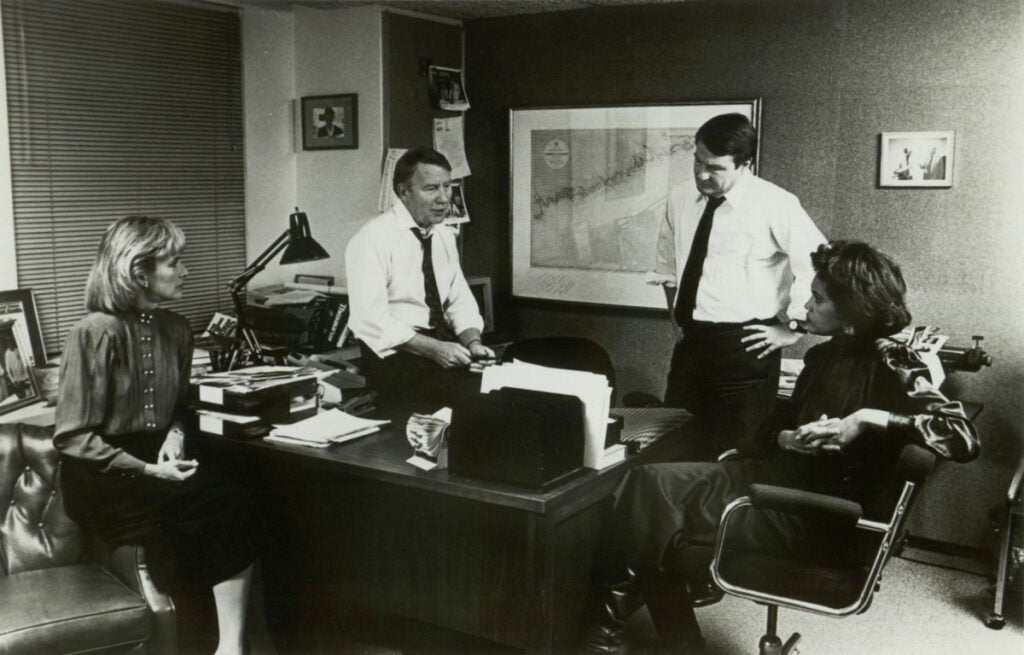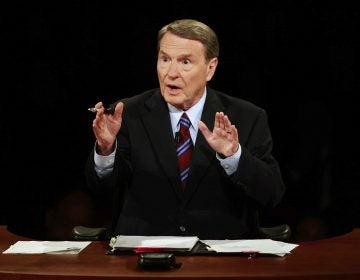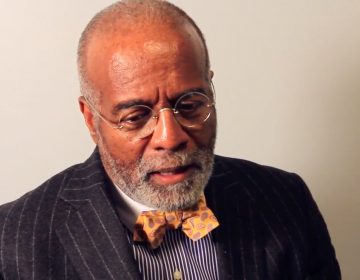Robert MacNeil, co-founder of PBS NewsHour, dies at 93
His connection to PBS began in 1971, when he was hired to co-anchor NPACT, the National Public Affairs Center for Television.
This story originally appeared on PBS.
Robert MacNeil, a pioneer of public media journalism and a driving force behind the show that would become the PBS NewsHour, died Friday at the age of 93.
A lifelong lover of language, literature and the arts, MacNeil’s trade was using words. Combined with his reporter’s knack for being where the action was and a refusal to sensationalize the news out of respect for his viewers, he covered some of the biggest stories of his time.
He was on the ground in Dallas when President John F. Kennedy was assassinated. He interviewed Martin Luther King Jr., Ayatollah Khomeini, Fidel Castro, and former British Prime Minister Margaret Thatcher. But he had his biggest breakthrough with the 1973 gavel-to-gavel primetime coverage of the Senate Watergate hearings.
That Emmy-winning series of special reports was also the turning point for the future of daily news on PBS, leading to the creation of The Robert MacNeil Report, before it was renamed The MacNeil/Lehrer Report, The MacNeil/Lehrer NewsHour, and other subsequent iterations, all the way up to the PBS NewsHour. As co-founder and anchor, he helped guide millions through extraordinary times with his intelligent, passionate and humane storytelling.
In a 2000 interview, MacNeil said that he and news partner Jim Lehrer aimed to add “a kind of respect for complexity to the news that was already there.” Their approach, he said, was based on “fundamental fairness and objectivity, and also the idea that the American public is smarter than they’re often given credit for on television, and they don’t all need things in little bite-sized, candy-sized McNuggets of news.”
“Robin MacNeil was a giant in journalism, and a most gentle giant. His and Jim Lehrer’s commitment to the news standards we practice still at the NewsHour are an ongoing inspiration to our newsroom and the industry overall,” said Sara Just, the senior executive producer of the PBS NewsHour, PBS News Weekend and Washington Week, and senior vice president at WETA .
Known to his friends as Robin, MacNeil was born in Montreal and raised in Halifax, Nova Scotia. His Canadian roots remained important to him throughout his life, and he spent part of his summers at a home by the sea — a love that came from his parents. His father, also named Robert, was a lieutenant commander in the Royal Canadian Navy during World War II and later a Canadian foreign service officer. His mother, Margaret, instilled in him his love of poetry and language.
He was married three times, including for 30 years to Donna MacNeil, who died in 2015. He had four children — Cathy, Ian, Alison and Will — and numerous grandchildren.
MacNeil set out first to be an actor. But after graduating from Carleton University in Ottawa, he turned to journalism. He worked for Reuters and NBC News, for whom he would cover a wide range of stories both abroad and at home.
He was in Dallas in 1963 when Kennedy was shot and killed, even reporting live by phone from inside the Texas school book depository where Lee Harvey Oswald worked.
“I heard that this guy called Oswald had been arrested who worked at the book depository and I said, ‘Isn’t that odd. That’s the building I went into. God, he must have been coming out about the time I went in,’” MacNeil said.
His connection to PBS began in 1971, when he was hired to co-anchor NPACT, the National Public Affairs Center for Television, which at the time was public broadcasting’s news-related programming unit in Washington. But it wasn’t until 1973, during the height of the Watergate fallout, that MacNeil was first teamed with Lehrer. The two rebroadcast the hearings with analysis late into the night — some 250 hours in all.
On the 40th anniversary of the hearings, the former anchors remembered what it was like to react in real time to the revelations, and how the political and media culture differed from today’s. Back then, some of the disclosures “came out quite unexpectedly. In a very casual, almost off-hand manner,” MacNeil said in an interview on the NewsHour. “Everything is underlined nowadays. Everything has arrows pointing at it. ‘This is going to be a great day today and we’re likely to hear–.’ We didn’t have any of that kind of buildup. It’s just — The hearings spoke for themselves.”
The success of their coverage — and the chemistry of their team — led to the creation in 1975 of The Robert MacNeil Report, with Lehrer as the show’s Washington correspondent, before becoming a full partner in The MacNeil-Lehrer Report.
“Many people in public television had thought we should be doing sophisticated entertainment, and education and culture, and not journalism, not public affairs, because that would cause controversy and everything,” MacNeil remembered in 2016. “But our coverage of the Senate Watergate hearings, which clearly were a turning point in this country in all kinds of ways, got more and more people suddenly watching their public television stations and sending money to them. That turned people’s heads around and public television and people began saying, ‘Well, you become a team, you should do a daily show.’”
The bold transition to a full hour — as The MacNeil / Lehrer NewsHour — came in 1983. But providing an alternative to commercial networks was what Robin and Jim saw themselves doing from the beginning.

“Robin was one of a kind. With his distinctive voice, he brought stories to life — unraveling complex issues with clarity and compassion. Whether it was through his incisive reporting or his intimate interviews, he possessed a singular ability to connect with people. As we reflect on his many contributions, we honor his memory by continuing to pursue the truth and by fostering connections that bridge divides – just as Robin did with such grace and vigor. We are deeply grateful for the enduring legacy he leaves behind,” PBS NewsHour co-anchors Geoff Bennett and Amna Nawaz said.
The hour-long program became noted for its civil tone and the depth of its coverage, gaining honors, viewers — and the attention of cartoonists. A 1981 “Doonesbury” comic imagined Robin saying: “I’ll be asking smooth, urbane questions from New York. Jim Lehrer will handle the earnest, plain-spoken questions from Washington.” And The New Yorker poked fun at the way the two were occasionally mixed up by viewers.
Through the years, Robin insisted on the importance of including the arts in the NewsHour’s reporting. He regularly talked with writers and other artists in this country and abroad.
The pair also enjoyed being part of the public television family, including visiting the cast on “Sesame Street” to interview Oscar the Grouch.
Even while co-anchoring the nightly program, Robin took on other projects, especially focused on his passion for language. His 1986 round-the-world, nine-part series, “The Story of English” — broadcast on PBS and the BBC — explored the history and development of the language, eschewing the idea that any one version of English was the “correct” version, and delighting instead in the rich variety. Later came a sequel about language in the U.S., called “Do You Speak American?”
“There is nothing more enjoyable than going around the country and just talking to people,” he said in a 2005 interview. “I’ve always been fascinated by how differently people talk, and the humor in that and the sense of personality that comes from that, and the sense of local identity.”
In 1995, he decided to step away from daily journalism to focus on writing fiction and other projects.
“He’s leaving permanent tracks along the way he traveled and worked and created. They are tracks of courage to do what he knew to be right and to actually do it right and to do it with grace and class and with good humor,” said the late Jim Lehrer, his longtime partner and close friend, during Robin’s final appearance in the anchor chair.
SOT/ JIM: “Hey, Robin.”
SOT/ ROBIN: “I guess that is it.”
SOT/ JIM: “ Hey good night, Robin.”
SOT/ ROBIN: “Good night, Jim.”
As one of the heads of MacNeil-Lehrer Productions, Robin remained involved with the NewsHour until 2014.
His writings include the 1992 novel “Burden of Desire,” which followed the impact of the famous WWI explosion in Halifax harbor, and numerous nonfiction works. Among those were three memoirs: “The Right Place at the Right Time,” “Wordstruck,” and “Looking for My Country,” the last of which detailed the love he had come to feel for his adopted land.
“All the years I was becoming embedded, so to speak, in this country, literally and figuratively, living through all the traumas of America, both personally with, alongside Americans and covering them as a journalist,” he told CSPAN in 2003. “There was, in my being, a disconnect between the country I inhabited and the country that inhabited me. I was a man with a nationality, but without a psychic country, so to speak.” He became an American citizen in 1997.
Continuing his deep connection to the arts, Robin served as chairman of the MacDowell Artist Colony in New Hampshire for 17 years.
“The real importance of art is that it is the greatest expression of American ideal of freedom. Artists are intellectually and creatively freer than anybody,” he told Jeffrey Brown in 2007 during MacDowell’s centennial celebration.
He also continued to make documentaries, including the 2007 PBS series, “America at a Crossroads,” about the war on terror, and a 2011 NewsHour series titled “Autism Now,” a very personal project that included the story of his grandson, Nick.
He was a fellow of the American Academy of Arts and Sciences, and gained many honors over the years, including induction into the Television Academy Hall of Fame in 1999, along with Jim.
In addition to his family, friends and admirers, Robert MacNeil is remembered — with respect, gratitude and love — by those who worked with him.
“I am so deeply saddened at the loss of a precious friend. One of the greatest honors of my life was working with Robin MacNeil and being part of the way he and Jim Lehrer changed television news. He was brilliant and urbane, but always with a delightful sense of irony,” said Judy Woodruff, a senior correspondent and the former anchor and managing editor of the PBS NewsHour. “I’m so grateful to have spoken with him in January on his birthday, when that iconic, deep Canadian baritone voice sounded exactly as it had when he last anchored the NewsHour almost 30 years ago.”
Looking back on his career, MacNeil noted the unique position the NewsHour, his creation, had inhabited for decades: “Given the dozens of channels now that are doing something called ‘news,’ from the serious to the comic, this is the one that has stayed absolutely gimmick-free and, therefore, its uniqueness is more apparent now, I think, than it was when we started 30 years ago.”

Get daily updates from WHYY News!
WHYY is your source for fact-based, in-depth journalism and information. As a nonprofit organization, we rely on financial support from readers like you. Please give today.




